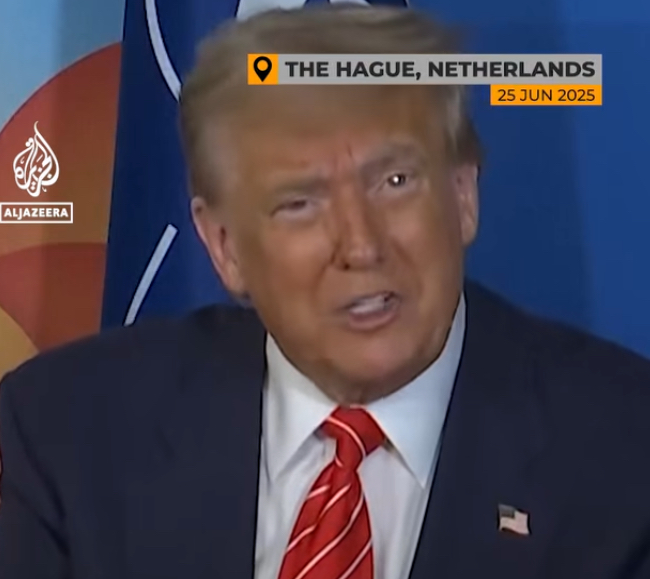NFL
“Trump Likens US Strikes on Iran to Hiroshima and Nagasaki, Claims Attacks Ended War at NATO Summit”

THE HAGUE, Netherlands, June 25, 2025 — U.S. President Donald Trump ignited a firestorm of debate at the NATO summit in The Hague on Wednesday, comparing recent U.S. airstrikes on Iranian nuclear facilities to the atomic bombings of Hiroshima and Nagasaki in 1945. Speaking to reporters alongside NATO Secretary General Mark Rutte, Trump claimed the strikes, which targeted Iran’s nuclear sites at Natanz, Fordow, and Isfahan on June 22, were decisive in ending the Israel-Iran conflict, asserting, “I don’t want to use Hiroshima as an example, I don’t want to use Nagasaki as an example, but that was essentially the same thing. That ended that war. This ended this war.”
The provocative analogy drew sharp criticism from historians, diplomats, and allies, particularly Japan, a key NATO partner nation still grappling with the legacy of the 1945 bombings that killed approximately 140,000 people in Hiroshima and 74,000 in Nagasaki, mostly civilians. Laura Jenkins, a historian at the University of Chicago, called the comparison “misleading and inflammatory,” noting, “There’s no comparing conventional military strikes, however forceful, with the catastrophic and indiscriminate destruction of atomic bombs.”
The U.S. strikes, conducted in coordination with Israel, followed a rapid escalation in the Middle East. On June 13, Israel launched a large-scale operation against Iran, accusing it of advancing a secret military nuclear program. Iran retaliated with Operation True Promise III, targeting Israeli military sites. The U.S. intervention on June 22 aimed to cripple Iran’s nuclear capabilities, with Trump initially claiming the strikes achieved “total obliteration” of the facilities. However, a leaked U.S.
Defense Intelligence Agency (DIA) report, cited by Reuters and other outlets, suggested the strikes only set Iran’s nuclear program back by a few months, prompting Trump to dismiss the intelligence as “very inconclusive.”
At the summit, Trump doubled down on his narrative, insisting the damage was severe and citing a statement from the Israel Atomic Energy Commission claiming Iran’s nuclear program was set back “by many years.” He also lashed out at U.S. media outlets, calling CNN, The New York Times, and MSNBC “scum” for reporting the DIA’s assessment. “They’re bad people, they’re sick, and they want to turn this incredible victory into something less,” he said. An Iranian Foreign Ministry spokesperson, however, told the Associated Press that the country’s nuclear facilities were “severely damaged,” though Iran maintains its program is for peaceful purposes.
The ceasefire between Israel and Iran, announced days after the U.S. strikes, has held for nearly two weeks, offering a rare moment of calm in the region. Trump credited the strikes for forcing Iran to the table, stating, “If we didn’t take that out, they’d be fighting right now.” Yet, French President Emmanuel Macron, speaking at the summit, called the U.S. action “illegal under international law” and urged a return to diplomacy to address Iran’s nuclear ambitions. Macron emphasized the need for resumed “diplomatic and technical work” with Iran, the U.S., and European nations, noting he would meet with International Atomic Energy Agency (IAEA) Director General Rafael Grossi later that day.
The IAEA, which has found no concrete evidence of an active Iranian nuclear weapons program, reported on June 18 that Iran’s nuclear activities remain under scrutiny. Iran’s parliament, in response to the strikes, voted to suspend cooperation with the IAEA, signaling heightened tensions.
Trump’s remarks also overshadowed other discussions at the NATO summit, where member states agreed to increase defense spending to 5% of GDP by 2035, a move Trump hailed as a personal victory. NATO Secretary General Rutte praised Trump’s leadership, noting the spending increase “would not have happened” without his influence. The summit also saw Trump meet with Ukrainian President Volodymyr Zelensky to discuss the ongoing conflict in Ukraine, though details of the talks remained limited.
Critics warned that Trump’s Hiroshima-Nagasaki analogy could strain relations with Japan, where survivors, known as hibakusha, continue to face radiation-related illnesses and psychological trauma. Political scientist Afsaneh Farhadi called the comparison “a singular tragedy” that risks trivializing the horrors of nuclear warfare. Japan’s absence from the summit, alongside South Korea, was noted by observers, with some speculating it reflected unease with Trump’s rhetoric.
As the ceasefire holds, the international community faces a delicate path forward. Iran’s nuclear intentions remain a point of contention, with Trump warning of further strikes if Tehran resumes enrichment activities. Meanwhile, calls for de-escalation and dialogue grow louder, with Macron and other leaders urging a diplomatic resolution to prevent a broader conflict. The fallout from Trump’s remarks, however, may complicate efforts to maintain unity among NATO allies and other global partners.
LISPRINCE












